

Untitled. Helen Elizabeth Clark, ONZ SSI (born 26 February 1950) was the 37th Prime Minister of New Zealand, serving three consecutive terms from 1999 to 2008.
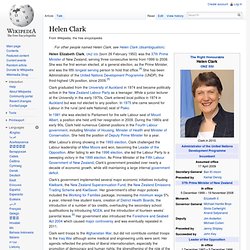
She was the first woman elected, at a general election, as the Prime Minister, and was the fifth longest serving person to hold that office.[4] She has been Administrator of the United Nations Development Programme (UNDP), the third-highest UN position, since 2009.[5] Clark's government implemented several major economic initiatives including Kiwibank, the New Zealand Superannuation Fund, the New Zealand Emissions Trading Scheme and KiwiSaver. Her government was defeated in the 2008 election and she resigned as Prime Minister and Labour Party leader. She resigned from Parliament in April 2009 from her Mount Albert electorate and was replaced by David Shearer to take up the post of Administrator of the United Nations Development Programme.
Mozilla Firefox. Book review Confessions of a Union Buster, by Martin Jay Levitt, Crown Publishers Inc., 302 pp., hardcover, $25.
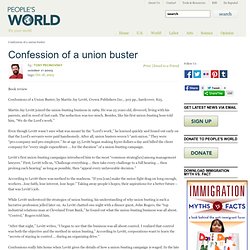
Levellers. Nation Readers' Top Ten Protest Songs. Egypt's revolution through the eyes of five women. 13 April 2011Last updated at 19:58 ET By Bill Law BBC News, Egypt The Egyptian revolution did not occur out of the blue.

Activists, male and female, have for years been pushing for change. Here, five women who helped to shape and define the revolution - a young blogger, the daughter of a powerful Muslim Brother, a Coptic Christian doctor, a persecuted democracy activist and a labour organiser - explain what it means to them. Dalia Ziada fears that some of the gains of Tahrir Square are already being lost Dalia Ziada: When I first met Dalia she was a wide-eyed cyber activist determined to use her blogs to secure rights for all Egyptians but especially for women.
Raw Video: Thousands Protest Anti-union Bill. W. E. B. Du Bois, THE SOULS OF BLACK FOLKS: Table of Contents. Zenadina's Channel. Labour law in America: Showdown in Madison. Politics in Burma from 2009 to now on. Darfurcrisis. Egypt Uprising. Egypt protests. WikiLeaks. Abolition of slavery timeline. Alexandre Pétion. Alexandre Sabès Pétion (April 2, 1770 – March 29, 1818) was the first President of the Republic of Haiti from 1807 until his death in 1818.
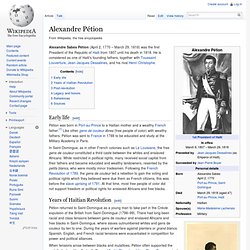
He is considered as one of Haiti's founding fathers, together with Toussaint Louverture, Jean-Jacques Dessalines, and his rival Henri Christophe. Alexandre Pétion Early life[edit] Pétion was born in Port-au-Prince to a Haitian mother and a wealthy French father.[1] Like other gens de couleur libres (free people of color) with wealthy fathers, Pétion was sent to France in 1788 to be educated and study at the Military Academy in Paris. Jean-Jacques Dessalines. Jean-Jacques Dessalines (Haitian Creole: Janjak Desalin) (20 September 1758 – 17 October 1806) was a leader of the Haitian Revolution and the first ruler of an independent Haiti under the 1801 constitution.
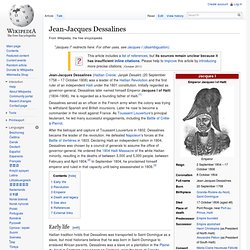
Initially regarded as governor-general, Dessalines later named himself Emperor Jacques I of Haiti (1804–1806). He is regarded as a founding father of Haiti.[1] Dessalines served as an officer in the French army when the colony was trying to withstand Spanish and British incursions. Later he rose to become a commander in the revolt against France. Hugh O'Flaherty. Monsignor Hugh O'Flaherty, AD (28 February 1898 – 30 October 1963) was an Irish Roman Catholic priest and senior official of the Roman Curia, and significant figure in Catholic resistance to Nazism.
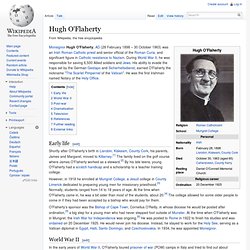
During World War II, he was responsible for saving 6,500 Allied soldiers and Jews. The Hawblog: Mark Twain's flag for the American colony in the Philippines... Mark Twain was one of the most prominent opponents of the Philippine-American War and an outspoken anti-imperialist - an aspect of his biography that is probably as rarely mentioned in high school English classes as his critical views on religion.
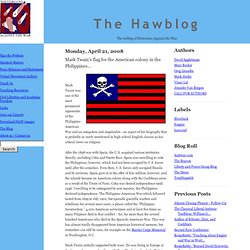
After the 1898 war with Spain, the U.S. acquired various territories directly, including Cuba and Puerto Rico. Spain was unwilling to cede the Philippines, however, which had not been occupied by U.S. forces until after the armistice. Even then, U.S. forces only occupied Manila and its environs. Ceuta border fence. The fence The Ceuta border fence is a border barrier between Morocco and Spain at Ceuta, a city in the North African coast.
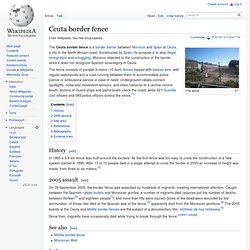
Constructed by Spain, its purpose is to stop illegal immigration and smuggling. Melilla border fence. The Melilla border fence is a border barrier between Morocco and the Spanish city of Melilla.
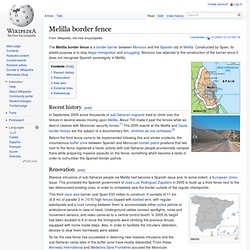
Constructed by Spain, its stated purpose is to stop illegal immigration and smuggling. Morocco has objected to the construction of the barrier since it does not recognise Spanish sovereignty in Melilla. Recent history[edit] In September 2005 some thousands of sub-Saharan migrants tried to climb over the fences in several waves moving upon Melilla. About 700 made it past the fences while six died in clashes with Moroccan security forces.[1] The 2005 events at the Melilla and Ceuta border fences are the subject of a documentary film, Victimes de nos richesses.[2] Renovation[edit] Massive intrusions of sub-Saharan people via Melilla had become a Spanish issue and, to some extent, a European Union issue.